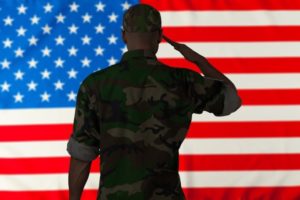Better Living Through Spravato?
The Military Times reported on Wednesday August 21, 2019 that President Trump said he had instructed Veteran Affairs officials to make a massive purchase of Spravato from Johnson & Johnson in an effort to stem the problem of suicide among veterans. VA research indicates there are about 20 veterans daily who are successful suicides. The President believes Spravato can “really do something” for suicide prevention. He said, “It’s pretty well known, it just came out. We have calls in to Johnson & Johnson now, we’ve been talking to them for two months on buying a lot of it. . . . Hopefully we’re getting it at a really good cost.”
This seems to be the latest step in efforts to find a solution to the problem of suicide among veterans. In 2015 Congress passed the Clay Hunt Suicide Prevention Act, named for a Marine Corps veteran activist who took his own life in March 2011. The legislation required VA officials to provide annual reviews of mental health care and suicide prevention. While the 2018 annual report gave high marks to the department for their mental health support, that did not translate into fewer suicides. Rege Riley, the National Commander for AMVETS, said “More than 24,000 veterans have died by suicide since the passage of the Clay Hunt Act. . . . God willing, we won’t be stuck with the same system we have now in 2023, with a new report that highlights only that what (they) keep doing continues not to work.”
In response, there has been legislation proposed, while the White House announced on March 5, 2019 the formation of a new task force on preventing veterans suicide, PREVENTS—the Presidents Roadmap to Empower Veterans and End a National tragedy of Suicide. The new order gives agency officials a year to develop plans for a more aggressive approach to suicide prevention. VA officials estimate that around 70% of veterans who take their lives have little or no contact with the federal veteran system. The task force will look to develop a new grant system similar to the Housing and Urban Development-VA Supportive Housing (HUD-VASH) program that is widely credited with decreasing the number of homeless veterans by half.
The very same day the FDA announced the approval of Spravato. Over the next 24 to 48 hours the Department of Veterans Affairs was flooded with requests and orders for the drug, largely because the President thought the drug would be good for the VA and he wanted to buy “truckloads” of it. By the end of the week, more than 20 people at the Veterans Health Administration (VHA) were actively trying to get Spravato to patients. “Within two weeks, likely a record for the usually lumbering approval process, the VHA was announcing that the drug would be made available to vets. By the end of March, scores of physicians would be involved.”
How the president learned of the drug and how exactly his enthusiasm was communicated to the VA remains a mystery. The White House declined to answer questions on that subject, as did the VA. Johnson & Johnson, and its subsidiary Janssen Pharmaceuticals which makes the drug, had been partnering with the VA on anti-suicide programs as Spravato was being developed. J&J was also working with a trio of Trump associates from his Mar-a-Lago club who have influenced VA policies. The three associates did not return phone calls and messages from the Center.
There was a report by the Guardian saying sources inside the VA said staffers were essentially told by a senior official to drop everything and accelerate the availability of Spravato because the president had expressed enthusiasm for it. Additionally, while the drug trials for Spravato were being done, “J&J was also involved with a trio of men Trump knew through his Florida social club Mar-a-Lago who became advisers on VA issues.” The VA downplayed the claim, saying the three men were just individuals giving advice. The three said they “offered our counsel, and the advice of these healthcare experts, to assist the president, secretary and VA leadership in their making essential decisions.” Records from the Center for Responsive Politics indicated Johnson & Johnson spent a total of $6.6 million that year lobbying the federal government about pharmaceuticals and health products. In 2018 and 2019 it lobbied the VA on matters including “partnership with the VA on suicide prevention.” The company also gave $14,165 to Trump’s 2016 campaign.
Not everyone—even at the VA—is convinced of Spravato’s potential. In June of 2019, a team of VA clinicians voted against putting Spravato in the VA’s formulary for approved drugs. Instead, the VA will require prior authorization for patient’s treatment with the medication. A VA spokesperson said, “These evidence-based processes will ensure the medication is prioritized for use in veterans who have not previously responded to adequate trials of other available treatments for major depression.” A Johnson & Johnson representative said the company was committed to working with the VA to ensure access to Spravato for patients who need it. “We firmly believe that people suffering from treatment-resistant depression, including our nation’s veterans, deserve the opportunity to benefit from this breakthrough medicine.”
There are serious reservations with the FDA’s approval of Spravato that include questions about how it was approved, how well it works, whether it is safe and its cost. “Data from the drug’s trials shows it to be only marginally better than placebos in its performance, several researchers and psychiatrists said after looking at the data.” There were also three successful suicides during the clinical trials of Spravato. Janssen, the subsidiary of J&J that brought the drug to market, said the deaths were not considered to be related to Spravato and the FDA concurred. The FDA Briefing Document for the advisory committee that voted 14 to 2 to approve Spravato said, “Given the small number of cases, the severity of the patients’ underlying illness, and the lack of a consistent pattern among these cases, it is difficult to consider these deaths as drug-related.” Kim Witczak, a national drug safety advocate, said “In my opinion, we need more information on the potential link to suicide before an assumption can be made that it’s safe.” See “Hype and Concern with Esketamine” and “Red Flags with Spravato” for more on the concerns with Spravato/esketamine.
Spravato as the solution for the military calamity of suicide very likely will take us to a worse place. Psychiatrist Peter Breggin noted that activation side effects from antidepressants mimicked symptoms of PTSD, “and are likely to worsen this common disorder in soldiers, increasing the hazard when they are prescribed to military personnel.” He concluded there is a strong probability that the increasing suicide rates among active-duty soldiers was “in part caused or exacerbated by the widespread prescription of antidepressant medication.” He said the symptoms of activation can combine adversely with similar PTSD symptoms found commonly in soldiers during and after combat. He suggested the military study the relationship between psychiatric drug treatment and suicide.
David Joslin was a medic for roughly 20 years He served as a combat medic throughout his military career. He jumped on every opportunity to excel in his field, attending advanced trainings whenever possible. He had deployments in Iraq and Afghanistan totaling 28 months of combat in Infantry and Cavalry units. The end of his military career came as the result of a break with reality during a simulated scenario at the Medical Skills Simulation Training Center (MSTC) in Fort Wainwright, Alaska. He was not, as he had thought, back in Iraq or Afghanistan. “There was no threat, I was not in danger, and I could not differentiate between the false reality that had been in my head and where I actually was.”
Towards the end of his military career he was prescribed a series of psychiatric medications. Effexor was the fifth different antidepressant they tried. He was prescribed Restoril to sleep, but it didn’t work. Prasosin made his nightmares go away, but made him catatonic. Adderall was prescribed to help him focus better, but it took away his appetite and made him “twitch like a meth addict.” Lowpressor treated the mild high blood pressure he developed after the heavy medication regimen. “At the height of my ‘better living through chemistry’ I was prescribed roughly 12 various drugs for the different symptoms that I was working through and the side effects the other drugs were creating. I literally lived one dose to the next.”
He slept on average two hours each day, and spent the rest of the time spiraling through depression and anxiety. He spent months of on-and-off contemplation of dying, but came to the conclusion suicide was not an option for him. He also came to realize the heavy volume of medications he was on was a significant part of the problem. He felt like “a helpless bundle of chemically controlled emotions, and not a man really in control of himself.” He doesn’t recommend the risk he then took when he flushed all his medications, putting himself into an acute psychiatric drug withdrawal. Nevertheless, “Regaining control of my life enabled my recovery, and it was only made possible through recognizing that the drugs I had been prescribed were causing irreparable harm, and would have killed me if I had stayed on them.”
Spravato has questionable efficacy with depressive symptoms and the data from the drug’s trials suggest it was only marginally better than placebos. More information on its potential link to suicide is needed before assuming it can be safely distributed to anyone, especially military veterans suffering from depression and PTSD. Better living through Spravato is not likely to happen and has the potential to worsen the veteran’s mental health problems.


